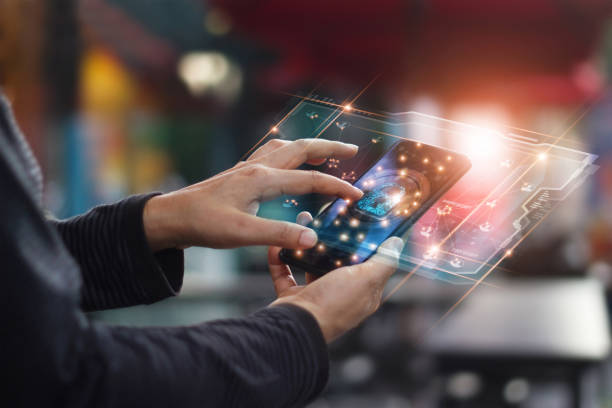When I was young, there was no social media. No, none. I had a small social network, some good friends but these were all in depth. We were not scared to call each other at any time to tell ouir stories. We would support each other. We would fight. We would make peace. It was a small network but an effective one. A network close to us. I would feel at my place. Today, social media has taken over our lives.
I get up, I look at my facebook site (or instagram :) )
I work, but whenever I have a break, I go back on social media. I ask myself if I missed something important.
I'm on the bus. I barely notice the people around me. I look at my telephone. I am not able to get bored and do nothing.
I'm waiting in line. I prefer looking at my telephone rather than have a conversation with an unknown person or even with a person that I know (?!).
With social media, we are hyper-connected with lots of people, but they are superficial contacts, like even people that we never met.
Now, it’s really the quality of our real social relations that have an impact on our mental health.
The need to socialize is fundamental. Unfortunately, this socialization is becoming more and more virtual.
A race for the ideal
Social media exposes us to people having exciting lives and doing pleasant activities. Perfect images that do not reflect reality. It's a race for success, for performance, for the ideal, and if you are not the image that society is suggesting, it's highly possible that you would feel depressed. Sometimes we compare ourselves. We want to prove that we have an interesting life by taking pictures to give ourselves importance.

The followers and the likes
We want to have more followers. But we ask ourselves what does it give ourselves to have 500 or 1,000 followers? One more or one less, what does it change in our life?
There are also likes. The tools that enable us to measure our popularity by the number of persons that lik what we published. We are always happy when we have more likes, but if it's the contrary, you don't have to be hurt. What does it bring us in reality to have 100 likes?

The Ego culture
Social media strongly encourages narcissism and the ego culture. Instead of turning towards others, we concentrate only on ourselves. Ourselves on a day-to-day basis, ourselves in a bubble. In reality, it shows a deep sense of solitude. Yes, it's a way to connect to someone else but it's through a filter. We put forward an image of ourselves that does not reflect reality necessarily. We want to please at all cost. This narcissism does not help mental health because mental health is to really connect with others.Direct exchanges, this is the way to really connect emotionally with others (or not). Not being able to communicate directly does not divulge our ideas to have a discussion. The bubble that we take refuge in does not allow us to have or not to have other perspectives.

A decrease in creativity
When we are continuously on social media, we tend to passively look at the content. Our brain is bombarded with images and texts that cross us at a crazy speed. We can put likes here and there or comment on some publications, but this information surcharge prohibits us to free our creativity in the arts, sciences, sports and more.
Intellectual independence
Social media users lose their intellectual independence. The algorithms are there to aim to the user preferences and to ensure to present maximum content that we know will please him, on what he will click on, that he will want to share and that he will want to use. The user ends by receiving from the algorithm information that constantly resembles itself. His perception of reality is based on contents that are screened constantly, which strengthens his reality. The fact of not being exposed to different perspectives, to new points of view, to different opinions, this does that his capacity to be critical is limited. Therefore the user is not challenged in his perception of reality and has difficulty to be open to different points of view.
The emotional support
Everything is not in black.
Social media provides also emotional support when the users interact in private. For example, a person who is depressed but who does not want to have a long telephone conversation can certainly benefit from talking on line with his loved ones.
Digital consciousness
With the arrival of social media opens also to a new consciousness. Before we were all isolated. Now, in real time, we are connected to the planet. We learn that there is a human catastrophe, we have an emotion for this, we want to react, we want to denounce, we want to help. With social media, we increase our consciousness of what is happening in the planet. We can feel the helplessness and also the addiction to these images. Furthermore, at the same time it has become a feature of everyday life, there is a development of human organizations and of blogs.

Conclusion
With social media, we have access to more people, more fame, more exchanges to make known our services and our products. All in all there are benefits. But on the other hand, their usage can compromise our ability to be here in the present moment and to be present for the persons who are dear to us.
The person who resists and does not participate in social media can be to a great extent excluded from interactions with his peers.
So what can we do to lift our eyes from our telephones and use social media in a healthy manner?
Surely, spend less time in front of our screens.
But beyond modifying this habit, I believe that asking the web giants to develop planetary ethics. This means that every action taken by the GAFA should be based on human rights. To say it differently, do the actions of the GAFA put the well-being of the person and the communities before economic purposes?
Prunelle

Je crois aussi que les réseaux sociaux nous ont permis de rester en contact les uns avec les autres pendant la pandémie. Peut-on imaginer rester en confinement et sans contacts sociaux pendant 2 ans ?
Pour moi qui veut avoir plus d’abonnés et plus de « like », c’est uniquement pour vendre mes bijoux. Sinon, ça ne me dérange pas de pas avoir de like. Des likes = $$$$
Bonjour, merci pour votre article, je partage bien votre point de vue. Je pense aux adolescents durant la pandémie qui ont cruellement manqué de contact sociaux. Quand il est interdit de voir ses amis, la vie ne fait plus de sens ! La pandémie a un peu obligé les adolescent à devenir dépendants des médias pour rester en contact avec leurs amis. Je serais curieuse de connaitre les répercussions à long terme de deux années privés de contact sociaux à l’adolescence. Je réalise aussi que je vais plus souvent sur les médias sociaux quand je me sens fatiguée, anxieuse ou triste. Il y a certainement une implication du « Reward System » du cerveau là dedans. Des « likes » c’est réconfortants sur le moment, puis on en veut d’autre et d’autre. C’est un cercle vicieux. Il y a du bon et du mauvais avec les médias sociaux, mais ils sont là pour rester, donc il faut s’adapter et trouver un équilibre là dedans…
Votre analyse est tout à fait pertinente. Je m’interroge encore sur les bons côtés. On ne crée pas plus de liens sociaux, au mieux on entretient ceux déjà existant. La volonté des réseaux dits sociaux qui, à ce jour appartiennent quasi tous au même groupe, est de nous faire entrer de plein pied dans le monde virtuel, j’en veux pour preuve la création du groupe méta. Le second but, detenir de la data, formidable monnaie d’échange et, enfin, engranger de formidables recettes publicitaires.
Pour compléter ce chapitre, la quantité d’énergie consommee par les serveurs et la chaleur dégagée est colossale alors…
Qu’est ce qui est bon pour la planète humanoïde ?
Du réel et un probablement une bonne réflexion sur le monde que l’on souhaite pour demain.
Belle soirée
Dominique